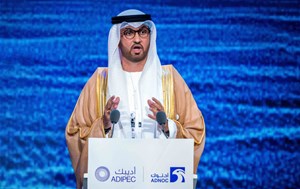ADIPEC 2023: Oil industry is “central” to global energy transition, executives say
(Bloomberg) – Ministers and oil industry chiefs are gathering for ADIPEC, the biggest energy conference in the Middle East, as crude heads toward $100 per bbl. Whether prices can hold at these levels and the outlook for OPEC+ supply cuts are among topics that will be discussed starting Monday.
But this year, climate is looming large over the forum. Delegates at the annual ADIPEC summit in Abu Dhabi, which has been dominated by oil in its long-running history, will devote a lot of their time to the energy transition. The meeting comes just two months ahead of the United Arab Emirates also hosting the crucial COP28 conference.
Oil firms must be heard in COP28, executives say. The oil industry is part of the energy transition and its voice should be heard at COP28, executives including Halliburton Co. CEO Jeff Miller, Liam Mallon of ExxonMobil and Gordon Birrell of bp, said in a panel discussion.
Companies need to upgrade downstream operations to lower emissions, while a transformation of upstream operations is also required, they said.
Electrification of operations, carbon-capture and emissions detection can support the decarbonization process, they said.
Shell CEO says investors will decide if low carbon is viable. Shareholders need to make a judgment on whether the low-carbon energy options that Shell Plc is pursing are viable, Chief Executive Officer Wael Sawan said.
“We need to be able to cover our cost of capital and make a return for our shareholders,” he said.
Oil industry is central for energy transition. Large swathes of the global oil industry will pledge to eliminate methane emissions and gas flaring by the end of the decade, the president of the COP28 climate summit said.
More than 20 private and state oil and gas producers have made the commitment alongside setting targets to reach net zero by 2050, Sultan Al Jaber said. He did not name the companies.
UAE warns about lack of oil investment as it boosts own capacity. The global oil industry has been losing capacity in the last few years due to a lack of investment, said United Arab Emirates Energy Minister Suhail al Mazrouei.
The minister rebuffed concerns about rising oil prices, arguing that crude needs to be high enough to justify making new investments. The UAE will expand its own capacity to 5 MMbpd by 2027, Mazrouei said. From 2025, OPEC+ production quotas will be based on the latest capacity numbers, not outdated figures, he said.
Non-OPEC+ oil supply is outstripping demand growth. Oil production in countries that are not part of the OPEC+ alliance, such as the U.S. and Canada, is growing faster than demand, Dan Yergin, Vice Chairman at S&P Global Inc., said in a Bloomberg TV interview. Still, continued supply curbs by Saudi Arabia can be worrying because of concerns over global economic growth.
India tells oil producers that prices are too high. India has “a constant dialogue with all producing countries where we keep raising this point” that crude prices are too high, Pankaj Jain, secretary at the Ministry of Petroleum and Natural Gas, said in an interview.
His country isn’t comfortable with current oil prices, which are near $93 per bbl in London, and “we need more production now,” Jain said. While India acknowledges OPEC’s right to decide how much they produce, the group’s cuts have increased prices.
“High prices lead to demand destruction,” Jain said. “Our viewpoint is we are finding these prices difficult to pass, difficult to continue to meet our energy needs.”
BP’s interim CEO Reiterates no change in strategy. There will be no change in bp’s strategy that was laid out in February, following the abrupt departure of Bernard Looney as head of the company, interim CEO Murray Auchincloss said.
“That’s a strategy that’s endorsed by the management team and endorsed by the board and a person leaving does not change the strategy,” he said. “We remain firmly committed to it.”
Looney resigned last month after admitting he had not fully disclosed relationships with colleagues. bp’s head of U.S. operations, David Lawler, has also quit to pursue other opportunities outside the company.
OPEC+ has “right policy,” UAE energy minister says. OPEC+ currently has the “right policy” for the oil market, the UAE’s Mazrouei said in an interview at the ADIPEC conference in Abu Dhabi.
Prices will increase if there’s no further investment in the industry, he said, adding that OPEC isn’t setting a price target.
Citi says oil to collapse to low $70s in 2024. Brent crude will collapse to the low $70s per bbl next year as the global market swings back to a surplus, according to Citigroup Inc. The shift reflects “more oil coming into the market,” analysts including Ed Morse said in a quarterly report.
“Higher prices in the near term could make for more downside for prices next year,” the Citi analysts said.
Deeper OPEC production curbs unlikely, Eni CEO reports. OPEC and its allies are unlikely to deepen their production cuts, Eni SpA CEO Claudio Descalzi said in a Bloomberg TV interview. Crude prices in London rose almost 10% last month as ongoing supply curbs squeeze the market.
A lack of investments in projects is the main issue for oil, while demand remains strong, Descalzi said.



